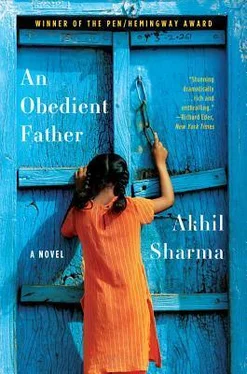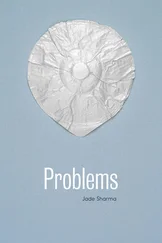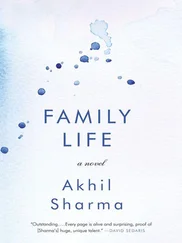Akhil Sharma - An Obedient Father
Здесь есть возможность читать онлайн «Akhil Sharma - An Obedient Father» весь текст электронной книги совершенно бесплатно (целиком полную версию без сокращений). В некоторых случаях можно слушать аудио, скачать через торрент в формате fb2 и присутствует краткое содержание. Год выпуска: 2000, Издательство: W. W. Norton & Company, Жанр: Современная проза, на английском языке. Описание произведения, (предисловие) а так же отзывы посетителей доступны на портале библиотеки ЛибКат.
- Название:An Obedient Father
- Автор:
- Издательство:W. W. Norton & Company
- Жанр:
- Год:2000
- ISBN:нет данных
- Рейтинг книги:4 / 5. Голосов: 1
-
Избранное:Добавить в избранное
- Отзывы:
-
Ваша оценка:
- 80
- 1
- 2
- 3
- 4
- 5
An Obedient Father: краткое содержание, описание и аннотация
Предлагаем к чтению аннотацию, описание, краткое содержание или предисловие (зависит от того, что написал сам автор книги «An Obedient Father»). Если вы не нашли необходимую информацию о книге — напишите в комментариях, мы постараемся отыскать её.
Ram Karan, a corrupt official in New Delhi, lives with his widowed daughter and his little granddaughter. Bumbling, sad, ironic, Ram is also a man corroded by a terrible secret. Taking the reader down into a world of feuding families and politics,
is a work of rare sensibilities that presents a character as formulated, funny, and morally ambiguous as any of Dostoevsky’s antiheroes.
An Obedient Father — читать онлайн бесплатно полную книгу (весь текст) целиком
Ниже представлен текст книги, разбитый по страницам. Система сохранения места последней прочитанной страницы, позволяет с удобством читать онлайн бесплатно книгу «An Obedient Father», без необходимости каждый раз заново искать на чём Вы остановились. Поставьте закладку, и сможете в любой момент перейти на страницу, на которой закончили чтение.
Интервал:
Закладка:
I tried speaking with the man who listened to our phone, but he would not respond when I jiggled the receiver and said, "Hello, hello."
The morgue is ten minutes from the Old Vegetable Market. The sky was darkening, but there was enough light to read shop names from the autorickshaw without effort. I kept thinking of Anita, Asha, Kusum, and Rajesh dying. The thoughts made me keep touching my forehead.
I imagined the building would smell strange, of formaldehyde and chemicals. When I rang the bell, a man in a white lab coat and rubber slippers opened a narrow door next to the wide ones. Mr. Gupta was not there yet. The man took me into the basement, which was a long white hallway with rooms on either side. Walking down it, I smelled flesh fermenting in death. The stench came in sudden eruptions through a sweet orange smell. "What's that orange?" I asked.
"To try covering the stink. It never works, but we have a lot of it to use up." The stench was so strong that my stomach curled and actually hurt. Most of the rooms we passed had curtains but no doors. Some of them were lit and revealed fragile-looking metal tables waist-high and just slightly wider than a kitchen counter. We stopped outside a door that was bolted. The smell was so strong that my throat would take in only sips of air. The technician pulled part of his coat over his mouth and nose and said, "Oh, God," with familiar disgust. He flipped a light switch on the wall outside the room and opened the door.
The creatures on the bare floor did not appear human. There were three and they had swollen limbs and faces. Parts of their skin were gray and other parts black. For a moment shock kept me from seeing Ajay among them. Someone had taken his shirt and shoes. He was wearing white pants. Along his throat were two close-together black cuts, one starting almost above where the other let off Then I realized that it was not dirt on his throat and his collarbones.
Once when Ajay was a child and visiting our office, he asked me to tie his shoelaces.
"Someone was sitting on his chest when they cut his throat. There were footprints on his shirt, along the ribs. Eight of his ribs are broken. But that could have happened in moving him."
"Put him on a table, for God's sake," I told the technician. And because I knew he would not listen to me, I added, "He's MP Roshan Gupta's son. Are you crazy?" I felt afraid for Mr. Gupta.
"I wasn't told anything," the technician said, lowering the lab coat. He was bald, with a thin face. He looked in my eyes to see if I was lying.
"Wash him, clean him. Or Mr. Gupta will put you in jail."
With me gripping Ajay by his pants and the technician holding him by his armpits, we were able to lift him onto a stretcher. Ajay's body had become rigid and this made him look surprised. We rolled him into a lift and, on the second floor, pushed him into a room where several men were sitting watching television. They had food spread on a long table with two sinks at one end. "Make him look all right. This is MP Roshan Gupta's son." I was not sure whether they believed me, but they set about their work, and I left the room.
I washed my hands with soap in one of the rooms on the second floor. The stink left them only after several washes. I then went outside. It was night now. The streetlights were on. Somewhere nearby dung chips were burning, giving the air a musty sweetness. The idea of Mr. Gupta's seeing Ajay as he was now frightened me, as if the event would add permanently to the weight of the world. While I waited I checked under my fingernails, because I could smell the stink again.
Mr. Mishra was the next person to arrive. I felt such relief at seeing him that I hugged him even before he had paid the autorickshaw driver. "I've been calling Mr. Gupta every day to have him sign something and he hasn't been calling back," Mr. Mishra said. "When I phoned tonight, a servant told me."
I described what I had seen, and we waited outside together. "I am glad my son has no political ambitions," Mr. Mishra said at one point, but mostly we were silent. I wondered why Mr. Gupta was taking so long.
We were about to go in and check on Ajay when, one after the other, perhaps ten cars and poHce jeeps pulled up before the morgue. The boy who parked for Mr. Gupta popped out of one and began lining the vehicles in a row along the road.
Mr. Gupta came to me and Mr. Mishra and thanked us for coming. He was wearing the suit he had worn at the prayer. We, along with Mr. Mishra, several BJP men, police officers in khaki uniforms, and five or six of Ajay's relatives whose names I did not know, moved together into the morgue.
Ajay was on a table on the second floor. The technicians had tugged a white short-sleeved shirt onto him, and they must have sprayed water inside his mouth and orifices, because drops kept slipping from his nose. The water somehow made Ajay appear more dead.
The stench was undiminished. My eyes teared from it, but perhaps from politeness, of the fourteen or fifteen men there, no one covered his mouth or nose. We stood around Ajay for several minutes. Mr. Gupta and Ajay's father-in-law, a tall Sikh with a loose white beard and a shirt pocket full of pens, stood closest to Ajay. His father-in-law was the only one crying, in slow sobs, like a candle beading as it melts. The BJP men whispered among themselves. A neighbor of Mr. Gupta's, a businessman, had taken off a heavy metal watch and was jiggling it in a loose fist. Two of Ajay's brothers-in-law, boys about seventeen and nineteen, leaned against a wall and looked at everything but him. Mr. Gupta kept turning his head from side to side, as if he was waiting for someone else to take charge.
I had to betray Mr. Gupta soon, I thought, or I would be betrayed. Here was a man who could not scare people away from killing his son. How was he going to win an election?
"He can't be taken home this way," Mr. Gupta finally said calmly, "he should be put in formaldehyde."
"Formaldehyde won't stop the smell," a technician answered. "The only thing that will stop the smell is a special coffin."
The BJP men stopped talking. The brothers-in-law looked at Mr. Gupta. But no one said anything for a while. "Shall we arrange the
coffin?" I asked. Mr. Gupta appeared lost again. The only alternative was to take the body directly from the morgue to the crematorium.
Ajay's father-in-law said, "Yes, do it." He had a rich British accent.
For several minutes the crowd stood still as Mr. Gupta watched the body. The doctor was supposed to come and reassure them that Ajay's body would receive the best possible care. I did not want to stay for this. I told Mr. Gupta that I had to return home. He did not acknowledge what I said.
Mr. Mishra left with me, and when we were outside, he hugged me. "Be careful," he whispered, "you are better than these thieves." The road was empty and all the shops had closed. We walked half a kilometer or so to the nearest bus stop. We did not speak. Mr. Mishra hugged me again before he got into his bus and I into an autorickshaw.
At home the tapped telephone made me think of Ajay, and the phone became pregnant with danger. Once Mr. Gupta lost the election, the BJP would not continue to protect him. He had no history with them. His ability to raise money would cease once corruption charges were brought against him. Congress might even have him killed. Because I had raised the Congress money which Mr. Gupta stole and because I had managed the sale of school lands, there was no way his fall would not include me.
I lay on my cot and imagined disappearing with the campaign money I would be found eventually and, if not, then the BJP's and Congress's anger would focus on Asha and Anita.
Congress was not as dogmatic as the BJP and would be easier to buy protection from.
Mr. Maurya was eating lunch by himself in his office, a small air-conditioned room. From the name printed on the paper napkins on his desk, I could tell that the food had been brought from a restaurant. When I sat down across from him, he said, "My wife is a vegetarian and won't eat with me if I am having
Читать дальшеИнтервал:
Закладка:
Похожие книги на «An Obedient Father»
Представляем Вашему вниманию похожие книги на «An Obedient Father» списком для выбора. Мы отобрали схожую по названию и смыслу литературу в надежде предоставить читателям больше вариантов отыскать новые, интересные, ещё непрочитанные произведения.
Обсуждение, отзывы о книге «An Obedient Father» и просто собственные мнения читателей. Оставьте ваши комментарии, напишите, что Вы думаете о произведении, его смысле или главных героях. Укажите что конкретно понравилось, а что нет, и почему Вы так считаете.












